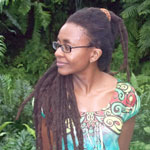sfwa_admin
in
sfwa
Nebula Awards 2010 Interview: Nnedi Okorafor
by Samuel Montgomery-Blinn

Nnedi Okorafor is the award-winning author of the young adult novels Zahrah the Windseeker, The Shadow Speaker, and the just-released Akata Witch, and her short fiction has appeared in Strange Horizons, Writers of the Future, Lightspeed, Clarkesworld, and the anthologies So Long Been Dreaming, Seeds of Change, Eclipse Three, Way of the Wizard, and Life on Mars, but it is her adult debut novel, Who Fears Death, which has garnered her first Nebula Award nomination. As does much of her fiction, Who Fears Death features a strong West African heroine - no strange territory for Okorafor, the Ohio-born daughter of Igbo Nigerian parents. It is her characters’ abilities to face and overcome their fears which empower them to take control of their destinies; it is her own ability to write without fear which brings these characters and their worlds to rich, vibrant life. A professor of creative writing at Chicago State University, Okorafor will also be the Amazon.com visiting writer at this summer’s Shared Worlds teen writing camp.
When you finished Who Fears Death what was your greatest fear about the book?
When I finished Who Fears Death, I knew I had written a hell of a novel and I wanted other people to read it. The “Oh-my-God-what-have-I-done?” feeling came just before publication. My greatest fear was that I was going to really piss off a lot of people. The novel takes on some heavy issues and it’s unapologetic and unflinching. It’s not a novel that tries to be prim and proper. It’s not polite. It doesn’t beat around the bush. And yes, it’s full of anger. My own anger. But there is great love in the novel, too, so I held on to that fact to assuage my fears.
Also, I feared that readers would get so caught up in trying to locate what was familiar or positioning the book in some tradition or slapping it with some label, that other aspects of the book would be ignored. I don’t know what the obsession is with needing to label things but it’s a practice that rarely serves me well.
Onyesonwu faces racism from both sides; she faces sexism from multiple male-dominated fronts; she faces loneliness and love and loss; and she faces her death, its manner but not time known to her for much of the book. Would you want to know the manner of your death ahead of time? How do you think it would change you? How do you see it as having changed Onyesonwu?
I wouldn’t want to know. I believe some things are written. Some. Knowing would only cause me to fixate on the inevitable as opposed to focusing on what it is that I was put here to do. How do I think knowing affected Onyesonwu? In her case, it liberated her to follow her instincts. But that was because she was already in a rather intense situation.
Read the rest of this entry »
Mirrored from SFWA | Comment at SFWA